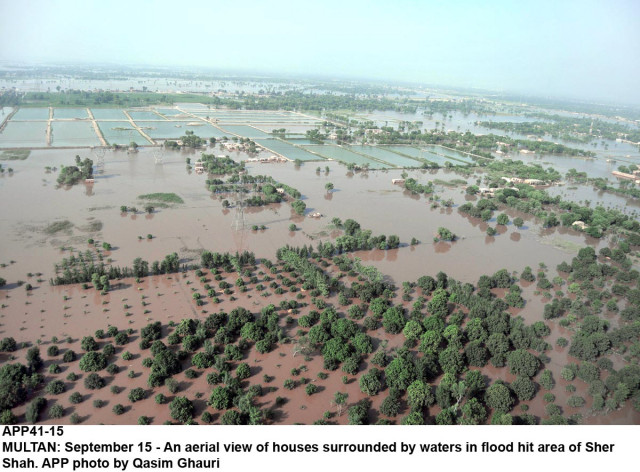A disaster in the making: Government fails to dismantle private dykes on the Indus
Influential people have encroached upon the riverbed, establishing farmhouses and cultivating crops.

Influential landlords, politicians, elected representatives, public and private companies and police officials have encroached upon the riverbed, where they are cultivating crops and establishing farmhouses.
A commission led by Justice (retd) Zahid Qurban Alvi was formed by the Sindh government after breaches in Tori and SM embankments in Kashmore and Thatta respectively caused devastation along both the banks of the river in 2010.

The commission’s report had highlighted the encroachments and the negligence on the part of government officials, but three years on, no action has been taken against the encroachers.
“Former Pakistan Peoples Party MPA Abid Hussain Sundrani has set up a farmhouse where he still cultivates land on the riverbed in Ghotki district,” said an irrigation official. “Despite tall claims made by government officials, no one has done anything about it.”
Claiming that the private dykes had significantly reduced the width of the riverbed, sources told The Express Tribune that the provincial government had written many letters to the Oil and Gas Development Company asking it to dismantle the dykes it had set up to protect its oil well near the Qadirpur gas field, but they were all in vain.
“The extent of the land mafia’s hold can be gauged from the encroachment at the mouth of the Sukkur barrage, where DIG Dr Sain Rakhiyo Mirani has occupied 20 acres of land for the cultivation of vegetables by his farmers,” said a senior irrigation department official, adding that of the 66 gates of the barrage, nine have been closed since 1942, allowing the building up of silt. Mirani and his relatives have taken advantage of this and taken over this land, erecting private dykes to protect their crops.
“You will find many villages in the 45-kilometre stretch of riverbed between Guddu barrage and Sukkur barrage, with people cultivating sugarcane, bananas and vegetables, and many of these settlements have even been leased illegally,” former irrigation minister Jam Saifullah Dhareejo told The Express Tribune. “The private dykes played a major role in the flood catastrophe of 2010. As a minister, I issued many evacuation notices, but to no avail.”
In Thatta district, villages such as Belo, Haji Allah Jurio Mallal, Muhammad Khan Bujaro, Abdullah Ghotiyo, Ibrahim Mallah and Vikiya were swept away by the floodwaters in 2010. Farmhouses in the riverbed were the major cause of this, especially the Shirazi and Pathan farmhouses near Kot Almon. Residents of the area said that most of these farmhouses belong to Thatta’s Shirazi brothers, who are now affiliated with Pakistan Muslim League-Nawaz.
But MNA Ayaz Shah Shirazi refused to accept ownership of these farms, saying that people were using their names to establish farmhouses in order to escape the blame.
Official sources said that a large network of dykes that obstruct the river’s flow fall in areas such as Monarki Surjani, Pinnah Baghar, Ali Bahar Aghemani and Hayan Sonda. A couple of years ago, an irrigation department team excused itself from visiting the ‘katcha’ areas in the Ghotki, Kashmore and Thatta districts, saying that the areas were a safe haven for dacoits and hence unsafe.
“How can we visit these areas and remove the private dykes when the law enforcement agencies are reluctant to give us protection?” asked irrigation secretary Babar Effendi, adding that the department had dismantled many private dykes in more accessible areas. “We cannot take action against the villages and settlements where the residents have obtained leases and stay orders.”
Effendi maintained that all political parties must come forward to devise a mechanism to get rid of the encroachments on the Indus river. Otherwise, Sindh will continue to suffer because of the floods.
Published in The Express Tribune, September 17th, 2014.



















COMMENTS
Comments are moderated and generally will be posted if they are on-topic and not abusive.
For more information, please see our Comments FAQ